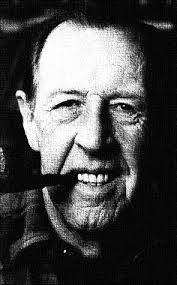WORKING WITH RAYMOND WILLIAMS TO TRANSFORM THE ARTS AND CULTURAL "SECTOR" (GUEST BLOG)
This new guest post by Nick Mahony, Stephanie Bolt and Russell Todd, argues that the people excluded by "arts and culture" in the UK are the same people who are all too often excluded from and marginalised by everyday life . They argue that now - as we approach the 100th anniversary of Raymond Williams' birth - is the time to rediscover his radical calls for collectively creative, democratic change at every level of our society.

When it comes to connecting and flourishing, the people who benefit least from the current economic and societal status quo are generally the same people who benefit least from how the existing ‘arts and cultural sector’ is currently organised.
The Covid-19 pandemic has cast new light on the injustices, inequalities and hierarchies of contemporary society. And while inequalities do not fully determine people's lives, the pandemic has once again shown how inequalities dramatically shape the conditions in which lives are lived, the risks people face, the possibilities people have to flourish - and therefore, ultimately, the potential that society and culture has to develop as a whole.
The Welsh author, critic and radical Raymond Williams, whose (non-fiction and fiction) books have sold in their millions worldwide, understood the connections between inequality and human flourishing better than most. He committed his life to addressing these connections, through his books, critical commentary and public activism, within Wales, around the UK and across the world.

Williams understood culture in a uniquely holistic way, insisting on the need to view culture as a part of economic and social forms of organisation (this was the basis of his signature ‘cultural materialist’ approach). He most famously stated that ‘culture is ordinary’ - using culture here in the anthropological sense, to refer to whole ways of life and common meanings; and culture to mean the arts and learning, including processes of creative discovery and imaginative action. “I insist on both” he said “and on their conjunction”. (See ‘Culture is Ordinary’; and ‘Culture and Society’.)
Williams demonstrates how connections, relationships and understandings between people, communities, society, economics and culture are constantly shifting and contested as part of a dynamic historically unfolding process. These processes are profoundly cultural, always entailing, to greater or lesser degrees, the questioning and reimagining of the existing status quo. Culture, Williams insists, should both exceed and ‘chafe against the existing order’ (Culture and Society).
So while Raymond Williams was concerned with ‘official’, ‘elite’ and ‘institutionalised’ forms of culture, over and above everything else, his commitment was to the possibility of collectively generating a ‘common culture’. As a cultural materialist, Williams recognised that the viability of the project of creating a common culture will always be contingent on producing the societal conditions that enable fundamental inequalities, injustices and hierarchies to be overturned; he advocated for a ‘long revolutionary’ process through which fundamental human equalities come to be recognised and human creativity can flourish.
Given how far we still are away from this, this journey will entail a struggle, a struggle to build the forms of solidarity and democracy that can lead to a more equal distribution and control of resources across society; and a struggle to develop much fairer processes of public decision making and democracy, to help identify and steer society's priorities and future direction.
If cultural workers and creative communities take a cue from Williams in our current context of societal crisis, this ‘sector’ of society must transcend current limits. Pre-existing injustices, inequalities and hierarchies cannot be maintained, the existing order is almost overwhelmed.
For example, despite funding the Communities First programme in Wales for 16 years - an unparalleled longevity among post-devolution era UK social programmes - poverty increased and inequality has widened in Wales. The modest gains made by the programme’s early years (when a more holistic view of poverty was taken and a more prominent role for communities was part of the programme’s fabric) were wiped out by the onslaught of austerity; an effect that the programme’s increased emphasis on employability from 2012, coming at the expense of non-employment related determinants of poverty, was powerless to withstand.
To connect and flourish in the 21st Century, Williams’ shows that there’s an urgent need to grapple with how creativity can play a more holistic, democratic and societal role. In keeping with Williams’ demand that the existing unequal, unjust and hierarchical order be resisted, reimagined and collectively developed - we invite the Arts Council and other similar infrastructure bodies not to remain detached like the Gods looking down upon mortals, but instead to support a wide-ranging and deeply-rooted process of solidarity building and change.
In the current crisis ridden context this requires an approach to arts and culture that engages with the vast majority of the population, including community groups, who are currently marginalised from this artificially constructed and rarified ‘sector’. As we move towards the Centenary of Raymond Williams his work deserves to be discussed anew: it offers ‘resources of hope’ which can help inspire long-overdue processes of far-reaching and long-term change.
Nick Mahony with Stephanie Bolt and Russell Todd. 27 October 2020